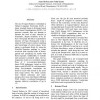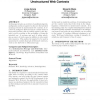31 search results - page 4 / 7 » Word Sense Disambiguation using Optimised Combinations of Kn... |
116
click to vote
LREC
2008
15 years 2 months ago
2008
Word Sense Disambiguation (WSD) is an intermediate task that serves as a means to an end defined by the application in which it is to be used. However, different applications have...
125
click to vote
BMCBI
2010
15 years 1 months ago
2010
Background: Word sense disambiguation (WSD) algorithms attempt to select the proper sense of ambiguous terms in text. Resources like the UMLS provide a reference thesaurus to be u...
EMNLP
2009
14 years 11 months ago
2009
This paper presents a supervised method for resolving metonymies. We enhance a commonly used feature set with features extracted based on collocation information from corpora, gen...
COLING
2008
15 years 2 months ago
2008
The use of topical features is abundant in Natural Language Processing (NLP), a major example being in dictionary-based Word Sense Disambiguation (WSD). Yet previous research does...
105
click to vote
KCAP
2009
ACM
15 years 7 months ago
2009
ACM
In this paper we give an overview of a multiontology disambiguation method, targeted to discover the intended meaning of words in unstructured web contexts. It receives an ambiguo...


